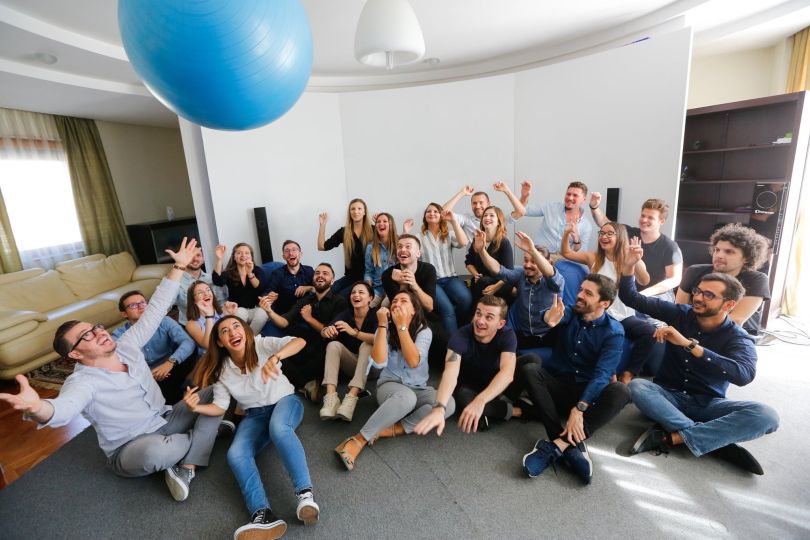Growing pains are named such for a reason. But unlike a person whose skeletal maturity occurs at random without an established pipeline, company leadership teams have the unique ability to control their rate of expansion as business demands evolve. Sales leaders in particular, with the right strategies in place, can make the challenge of scaling teams as painless and sustainable as possible while staying true to the company’s original mission.
How is this approach attainable, though, when the need to expand is immediate? It starts with intentional recruitment, scaling project-based passions in tandem with new infrastructures, and uniting employees behind a shared vision.
“As with all great teams, a successful sales team begins with the people you hire,” said Justin Young, SMB sales manager at Box. “As you hire the right individuals, you are simultaneously building your team culture.”
While every potential sales hire wields a different skill set and diverse background, identifying key traits or habits can be essential to building the strongest foundation for expansion. After all, people make up each company’s environment, and a like-minded culture of curiosity or collaboration will carry a team further than hiring someone with impressive client connections or high-revenue achievements alone.
To learn more, Built In Austin caught up with seven seasoned sales leaders to learn how they alleviate the pains of growth and why a hiring blueprint focused on long-term goals can make a company’s bones so much stronger.

What’s your blueprint for building a successful sales team? And how have you put that blueprint to work in your current role?
When building a sales team, we evaluate candidate performance and their track record. We also look for individuals who have a passion to work in a startup environment, and more importantly, share in our passion for our product and vision. At our stage as a Series A-backed startup, our team is still small. As such, it’s important for us to find individuals who are motivated to start at the ground level and work as a unit to scale and grow together.
We also love working with referrals, because “game recognizes game!”
What’s the most important characteristic you look for in a salesperson, and why?
Coachability. Coachable reps always have internal motivation to improve. They respond to feedback and actively seek it. This trait is vital to the success of the sales organization and to the professional growth of the individual salesperson.
It’s important for us to find individuals who are motivated to start at the ground level and work as a unit.”
When scaling, how do you ensure your team doesn’t lose the elements that made it so successful in the first place?
QuotaPath embodies teamwork and collaboration. To keep these elements in place as we scale, we are very intentional about who we hire. We look for high performers who share the same values as our company. We’ve had several instances when a proven, talented sales person has interviewed, but their values were not in alignment with ours. When that happens, no matter how many deals they could potentially win for us, we won’t move forward.
Regarding our training and onboarding, we invite voices from all functions of our organization to promote our culture of cross-department collaboration. For instance, members of our management team all lead separate onboarding sessions for new hires and anyone wanting to learn more. We also hold monthly “Byte & Bites” sessions, which are optional lunch and learns that anyone can attend to get an inside peek into different areas of the business.
We also love to celebrate, no matter how small or large. When new sales reps close their first deal, it’s a big event. Everyone joins in celebrating across Slack and in the office, including our entire executive team. Even our investors get in on the fun.
What’s your blueprint for building a successful sales team? And how have you put that blueprint to work in your current role?
As with all great teams, a successful sales team begins with the people you hire. As you hire the right individuals, you are simultaneously building your team culture. Winning teams have a culture of excellence built on collaboration, entrepreneurism and transparency. Creating and sustaining a healthy team culture is critical for team success. Fostering the right culture takes thoughtfulness regarding what we want for our team’s values and rhythms, and intentionality every day to live those out.
Hiring the right people and creating the right culture are great first steps, but they won’t last if the team is not successful. People will leave and the culture will deteriorate. Whether it’s providing customer feedback to our product team, aligning with marketing on our top-of-the-funnel efforts or coaching sales reps, it’s critically important that as a leader, you’re doing everything possible to ensure the team and each individual person is in a spot where they can be really successful.
I have built my teams by following those three steps: Hire the right people, prioritize a healthy culture and ensure my team members are set up for success.
What’s the most important characteristic you look for in a salesperson, and why?
The top quality I want in all salespeople is curiosity. Our job is to work closely with customers — to understand their business, their industry, what issues they are facing — and ultimately work together to find a solution to make them more successful.
When a salesperson has natural curiosity, they are inclined to ask better questions, to do research and to really get in the weeds with their customers. A curious mind will naturally move toward gathering information and considering solutions, which is ultimately what we want to do in sales.
The other key benefit of hiring curious salespeople is that curiosity often translates into introspection and a desire to learn and grow. The curiosity that fuels a desire to help our customers identify problems and create solutions is the same curiosity that will lead that person to ask questions of myself and their teammates and to investigate what skills others are using that could incorporate into their own approach. My hope is that my team members are constantly learning from one another and working to hone their skills, which requires curiosity.
Winning teams have a culture of excellence built on collaboration, entrepreneurism and transparency.”
When scaling, how do you ensure your team doesn’t lose the elements that made it so successful in the first place?
To successfully scale, I start with a clear vision for our team and I’m uncompromising in hiring and maintaining the team culture. Enablement is a core piece of scaling the team and begins with an onboarding process that focuses on training the key aspects of the job.
Many onboarding programs I’ve seen try to teach new hires every little thing that’s needed for success in the role. I’ve found that to be less successful than focusing on the few key areas that are the most important and then adding the other components over time as the rep is in seat. Onboarding is where we build the foundation that we continually build on top of through one-on-one coaching, formal trainings and regular feedback.
A key method I’ve used to scale success is by creating a culture of peer-to-peer teaching. One way our team acts on that norm is through our weekly deal reviews. Team members meet in smaller groups to go over an active opportunity. I provide structure for the time and occasionally ask a question, but the goal is for team members to honestly share and help one another. I have seen a lot of growth as reps learn from one another and coach each other in these times.
What’s your blueprint for building a successful sales team? And how have you put that blueprint to work in your current role?
A core attribute for building a successful sales team — and creating sustained success within a territory — is hiring account executives (AEs) that are passionate about solving customer problems and able to evangelize the full value of Rapid7’s portfolio. This requires a highly motivated AE that will get out in the market they are responsible for and ensure both the customer base and the reseller partner community are fully aware of our capabilities. The AE should strive to be a subject matter expert, not only on our solutions but also on latest industry trends and how our solutions fit into the larger security strategies and programs of our customers.
What’s the most important characteristic you look for in a salesperson, and why?
Attitude. One of our core values at Rapid7 is “never done.” This means having an attitude that embraces opportunities for growth while being focused on delivering value based on the customer’s desired business outcomes.
Rapid7’s mission is to help our customers close the security achievement gap, and it takes a dedicated individual willing to commit themselves to learning and adapting to the ever-changing security challenges our customers face. Product knowledge and sales skills can be learned, but a never-done attitude is inherent in an individual and has to be a core quality.
You can always hone your skills by taking advantage of the collective experience of others.”
When scaling, how do you ensure your team doesn’t lose the elements that made it so successful in the first place?
As we’ve grown, working together to drive impact have remained at the heart of our culture. We strive to provide an environment of open participation and collaboration, and encourage the team to bring forward challenging situations and solicit feedback from the group.
We hire new team members from a variety of different backgrounds, whether that’s from another technology company or an internal transfer of someone from another division within Rapid7. This creates a diverse group of people that can share experiences and best practices. We bring forward training from other groups to provide visibility, collaboration and contrast, and encourage our people to implement strategies that will incorporate new ideas and points of view. No matter how deep your experience, you can always hone your skills by taking advantage of the collective experience of others.
What’s your blueprint for building a successful sales team? And how have you put that blueprint to work in your current role?
The most important part of any successful sales team is the people, without question. The blueprint I have found that works — and scales — is to hire staff that embodies servant leadership and to create pathways for career advancement.
Servant leaders put their teams first and are willing to do whatever it takes to help grow and coach everyone around them to improve and perfect our craft as sales professionals. These leaders are capable of achieving incredible results while bringing optimism and cohesion to company culture. Nowhere have I seen this philosophy more embodied than at NinjaOne, where all departments and company leaders have a deep sense of care for each other to succeed.
Finally, opportunities for career advancement cannot be understated — people want to feel like there’s room for them to grow, learn and move into leadership roles themselves. Creating these pathways at NinjaOne has helped retain amazing staff and bring in top talent looking for opportunities.
What’s the most important characteristic you look for in a salesperson, and why?
It’s not easy to choose just one characteristic for a successful salesperson, but over the years I have narrowed it down to a few: grit, natural curiosity and coachability. If I had to elaborate on just one, it would be grit. Having grit means the individual has perseverance and a natural ability to keep going. Sales is a rewarding profession, but it’s not easy. You deal with adversity constantly with clients that are more likely to say no, or not now, than say yes.
Grit gives you the courage to move on to the next call, the next day or the next month with an optimism that you are offering something of value and you won’t be deterred. We have amazing leaders and sales enablement at NinjaOne, where we can teach sales teams each and every aspect of the NinjaOne platform, and coach them on how to do thoughtful discovery and needs analysis or negotiation techniques. What is nearly impossible to coach or teach is grit. I do believe grit can be learned and grown over time as you gain more life experience, but it has to be innate in a truly successful salesperson.
Opportunities for career advancement cannot be understated — people want to feel like there’s room for them to grow.”
When scaling, how do you ensure your team doesn’t lose the elements that made it so successful in the first place?
I think keeping the core elements of NinjaOne’s culture as we scale is truly one of the biggest challenges we face daily, and the same is true for any high-growth company. Culture will evolve as you grow, but the very core foundation must stay strong.
At NinjaOne, we are incredibly intentional about how we train and scale to keep our core culture strong. Sal Sferlazza, our CEO, meets each and every new hire class within the first 30 days of them coming on board where he will share with them that they have a voice inside NinjaOne from day one. I have seen Sal have coffee with a group of new hires and come back ready to alter a feature on our roadmap based on what he learned. NinjaOne doesn’t care about titles or who has been here for how many years — if you are part of NinjaOne, you have a voice. When the CEO of the company is leading by example, the rest of the leadership team will follow that lead and the culture will stay true to the original mission.
New hire enablement and training should also be major areas of focus to maintain a company’s culture. If a new hire’s onboarding experience is positive, that serves as a foundation to be successful in their career.

What’s your blueprint for building a successful sales team? And how have you put that blueprint to work in your current role?
The most important piece of building a successful team for me is putting a premium on hiring for hunger, drive and coachability over traits like relevant industry knowledge or overall sales experience. Having sold a similar solution and having a Rolodex in the industry you’re selling to is helpful for ramping up quickly, but the long-term value in building a highly competent team comes from those who are naturally driven, curious and coachable. They might take a few more months to get fully ramped up than someone who’s already been doing it for 10 years, but I’ve found that they will be more committed to the company that gives them a chance to develop and will close more revenue for you long term.
At Instapage, we’re fortunate to have an SMB solution as well as a mid-market and enterprise solution and that has provided us with the opportunity to have a smooth ramp for developing sales talent from within. We’ve been able to hire a number of entry-level sales development reps who’ve then achieved strong success within their first year and quickly moved into more senior positions. Having that internal promotion path not only gives us a deep roster of talent to develop, but it makes for hungrier sales reps.
What’s the most important characteristic you look for in a salesperson, and why?
Self-motivation and work ethic are the biggest items for me. The other top characteristics for me are written and verbal communication skills as well as the ability to quickly process information. Being able to quickly process the information you’re receiving from a prospect is a key component in tailoring your conversation and pitch based on the insights you’re gathering in real time. That’s not something you can evaluate in a resume or cover letter, so it’s important to do some mock sales conversations in the hiring process to uncover that.
The long-term value in building a highly competent team comes from those who are naturally driven, curious and coachable.”
When scaling, how do you ensure your team doesn’t lose the elements that made it so successful in the first place?
The ability to promote from within goes a long way towards retaining culture, as well as ensuring the best practices that you preach remain consistent throughout the sales org as you scale. Of course, when you’re scaling quickly, you will need to bring in some top talent externally. It’s essential that you ensure you have a robust onboarding and training plan that establishes a foundation of your culture.
Many new sales reps want to join a company and just hit the phones on day one to start building their pipeline. That attitude is great, but by slowing things down a bit and ensuring that each new hire goes through the same detailed onboarding process, you set yourself up to have a more cohesive and consistent sales organization. This gets the culture and best practices ingrained in them before they start selling.
What’s your blueprint for building a successful sales team? And how have you put that blueprint to work in your current role?
When considering a candidate, we value cultural add just as much as proven experience. Given the missional nature of the work we do here at Ontic, we want our candidates to not only be skilled in their role, but truly proud of the work they do. It’s important to get other managers and team members involved in the hiring process so we don’t make siloed decisions. Although it is tough — particularly in the current hiring environment — to scale a sales organization quickly, a deliberate and thorough process is worth the time in the end.
What’s the most important characteristic you look for in a salesperson, and why?
This is a nearly impossible question to answer. Great salespeople need to be good at a lot of things. Being skilled at communicating and relationship building are important.
Ultimately, the word “responsibility” comes to mind. A good salesperson can become a trusted advisor, both internally and externally. A great salesperson would never let you down once they’ve earned that trust. A strong work ethic and sense of commitment are critical to managing successful enterprise-level prospects and clients.
In order to scale culture within a rapidly growing organization, you need to drive ownership among the employee base.”
When scaling, how do you ensure your team doesn’t lose the elements that made it so successful in the first place?
Never stop talking about culture. Never stop talking about supporting the sales organization. Never stop talking about improving. Make culture just as important as the number. I believe we owe that to our company and our employees.
Additionally, as the organization grows, you need to ensure that culture is truly a shared value. Culture won’t last long if it is just dictated from above. In order to scale culture within a rapidly growing organization, you need to drive ownership among the employee base. That can be a bit scary, as the culture will undoubtedly change over time. But if you’ve hired well and work to keep culture a priority, it will eventually become a shared value across the organization.
What’s your blueprint for building a successful sales team? And how have you put that blueprint to work in your current role?
There simply isn’t one blueprint for a successful team. Like building a house, the blueprint is a function of the aim and strategy. Once those two essential elements are decided, you can determine proper resources needed to build and develop a team.
Set thoughtful objectives, align compensation plans and find the right people based on the problem you’re solving and the goals you need to achieve. Next, evaluate and invest in the right tools that help them achieve their objectives. Finally, help them maximize time selling and invest the largest percentage of your time and effort supporting them.
Success comes from people, so I spend greater than 60 percent of my time coaching, developing and empowering. I’m very fortunate in my current role to have had a great foundation set by the founders allowing me the opportunity to focus on organizing and optimizing the team and their efforts.
What’s the most important characteristic you look for in a salesperson, and why?
I don’t believe there is a most important characteristic. People are complicated and nuanced so, as best you can, it’s important to really understand each other’s nature, goals and experiences in order to make the most informed decision possible. No one has a perfect hiring track record, but the goal is to minimize the probability of making a wrong decision from both the candidate’s and your perspective.
When evaluating a person’s nature, I am really trying to understand their level of self awareness, intellectual honesty, authenticity and work ethic. This helps me better understand the type of person I’m working with and what motivates them. These are unteachable qualities and can give me a general sense of culture fit. Understanding the elements of work experience and aptitude is also very important, but for me comes second to understanding what makes a person tick.
Set thoughtful objectives, align compensation plans, and find the right people based on the problem you’re solving.”
When scaling, how do you ensure your team doesn’t lose the elements that made it so successful in the first place?
This will always challenge organizations as they move from 10 to 50 to 200 employees and I’ve made my share of mistakes in this area. I believe it is important to understand that some change is inevitable as your organization grows and evolves so collectively — as a team, plan for it and embrace it.
I find that the challenge of scaling can be greatly mitigated if you develop a highly collaborative, inclusive team and empower them to contribute to growth and scalability. Delegate key development functions to various members of the team including hiring, training and sales operation improvements. This allows for better scalability and broader, richer inputs into areas of decisioning.
Since the culture is primarily the result of the team you’ve assembled, they need to be relied on to help properly scale your organization in order to best maintain those winning elements that’s allowing you the opportunity to grow.

















